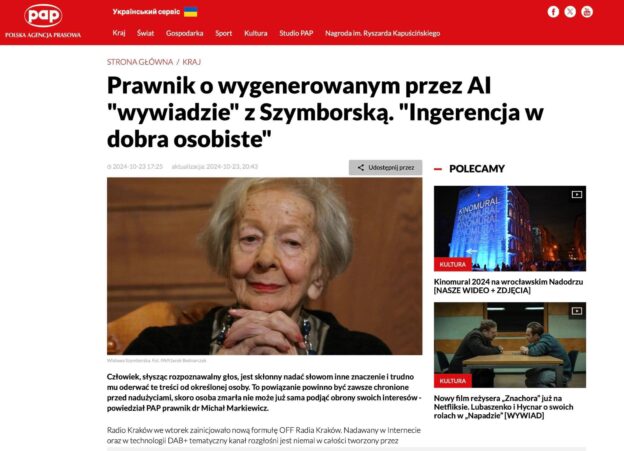Last week, Dr Michał Markiewicz gave a statement to the Polish Press Agency (PAP) regarding an alleged interview conducted by AI with the late Wisława Szymborska. The case aroused and continues to arouse a number of controversies, including when it was correctly labelled that the interview was in fact ‘fabricated’ and created entirely by AI. Particularly interesting questions: Was there any infringement of Wisława Szymborska’s copyright in the AI training (did Wydawnictwo Literackie exercise its opt-out option)? Are there, and if so, which personal rights oppose such activity? Is the right of publicity included in the right of publicity regulated by the copyright law? Does the right of publicity expire with the death of the person concerned or only 20 years after that date? Should the right to veneration of the memory of a deceased person also protect against situations of use of the characteristics of a deceased person (e.g. for the purposes of an interview) where, despite the correct indication that the content in question does not originate from the deceased person, the material presented looks as if the person in question was personally involved in it? To quote Dr Markiewicz: ‘I did not like the interview. At the same time, I believe that for such activity to be legal, consent to such activity should be given by the persons indicated in Article 78 of the Copyright Act and the subjects of the personal good in the form of the cult of memory of the deceased.’ Link to the material: https://www.pap.pl/aktualnosci/prawnik-o-wygenerowanym-przez-ai-wywiadzie-z-szymborska-ingerencja-w-dobra-osobiste?fbclid=IwY2xjawGNsPpleHRuA2FlbQIxMAABHSiJ-6nPZoTz-AHbSPKI0iNmbcHeYIg7cEIflY06dRUuhZ4MlNrUTfDj0w_aem_lLbKPCyNjgy614VXuISObg

